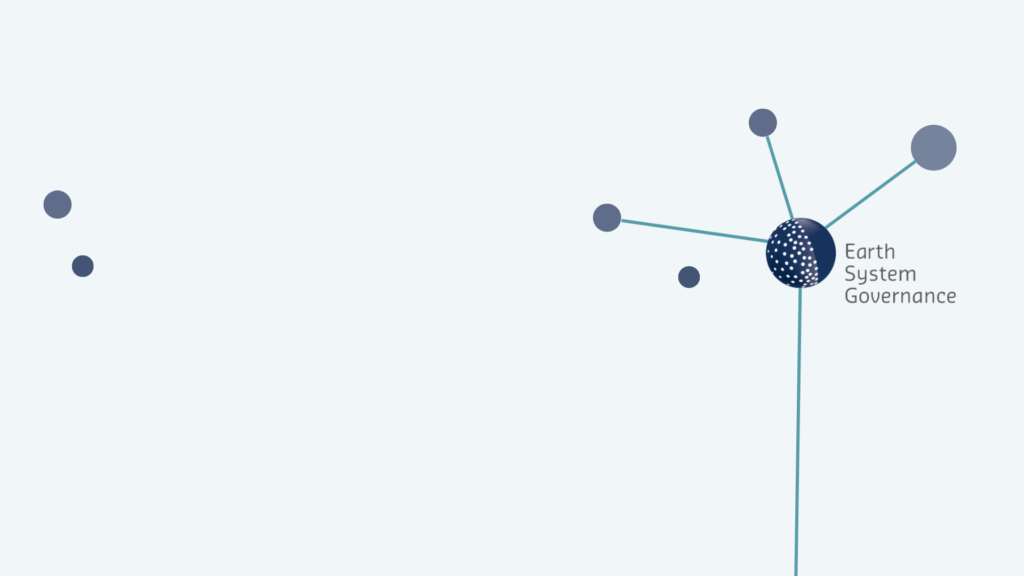Earth System Governance Tokyo Conference: Complex Architectures, Multiple Agents
United Nations University Head Quarters, Tokyo, 28-31 January 2013
We invite you to the Earth System Governance Tokyo Conference, to be held 28-31 January 2013 at the United Nations University Headquarters in Tokyo, Japan. This event is part of the global conference series organized by the Earth System Governance Project, a ten-year research programme under the auspices of the International Human Dimensions Programme on Global Environmental Change (IHDP). This conference will be the fourth in a global series organized by the Earth System Governance Project. The Earth System Governance Tokyo Conference will be jointly hosted by the United Nations University Institute of Advanced Studies (UNU-IAS), the International Environmental Governance Architecture Research Group and the Tokyo Institute of Technology on behalf of the Earth System Governance Project.
Key Dates
Deadline for paper abstracts: 1 July 2012
Notification of acceptance: 1 September 2012
Full papers due: 1 December 2012
Conference date: 28-31 January 2013
Conference Themes
Today, a multitude of agents plays a significant role in earth system governance, ranging from traditional state actors to international organizations, civil society organizations, science networks, city coalitions, or business associations. At the same time, the overall governance architecture, from local to global levels, is becoming more complex as a consequence of ever increasing needs for governance and policy-development. This situation poses fundamental questions about the impacts of fragmented and complex governance architectures, the overall effectiveness of earth system governance, and the ways in which multiple agents at all levels influence related processes.
This complex architecture with multiple agents is the core research problem to be discussed at the Earth System Governance Tokyo Conference. The conference will bring together scholars from a wide range of disciplines as well as practitioners from diverse backgrounds to address the nexus between the analytical problems of agency and architecture in earth system governance, and will also consider the other analytical problems identified in the Earth System Governance Science and Implementation Plan. The timing of the Tokyo Conference, half a year after the United Nations Conference on Sustainable Development (“Rio+20”), will make these discussions especially pertinent and timely. The conference may open up new and fruitful areas of science-policy interaction and strengthen the interface between science and policy in earth system governance.
We invite papers on six interrelated clusters of questions:
1. Earth System Governance Architectures in the 21st Century: The need for reform of the global institutional architecture for environmental and sustainable development governance has been discussed for many years, yet little progress in the political realm has been made so far. While some propose, for example, the creation of a world environment organization, others argue in favour of more decentralized architectures that try to configure multiple actors effectively. We invite papers that address various aspects of the basic design of the architecture of earth system governance. This includes papers that analyse advantages of centralized or decentralized governance architectures, multi-level governance, or governance and vision in the post-MDGs (Millennium Development Goals) era. Also important here is an investigation of the existing architecture and of the roles of various actors and actor networks in governance.
2. Climate and Energy Governance Architectures: Discussions about the advantages and disadvantages of various governance architectures have been particularly lively and fruitful in the area of climate and energy policy. A nuclear disaster in the aftermath of the March 2011 earthquake and tsunami in Japan highlighted even more the importance of effective and accountable governance in this domain at all levels. We thus invite papers that explore options for more effective architectures of future climate and energy governance. Papers could address, for example, effective multilevel governance architectures in the nexus between climate and energy security, or the optimal mechanisms to facilitate low carbon technology transfer, or the kind of partnerships that could combine actors of different scales and within and among different regions. Also important is how to fill the policy, implementation and financial gaps in designing the next generation of climate governance architectures.
3. The Nexus between Architecture and the other “A’s” in Earth System Governance: One of the most important research questions in the area of earth system governance is the intersection between architecture and the other four analytical problems (the “5 A’s”) identified in the Earth System Governance Science and Implementation Plan. Hence, we invite papers that explore these linkages and interactions. For instance, how can equity and fairness concerns (‘Allocation and Access’) be addressed in the design and implementation of environmental and development institutions? In what ways can private actors (‘Agency’) be held accountable (‘Accountability’) in environmental governance architectures? What types of resource re-distribution and social conflicts are created (‘Allocation and Access’) by different ways of structuring efforts (‘Architecture’) to enhance the resilience of social-ecological systems (‘Adaptiveness’)?
4. Political Dynamics in the Interface of Agency and Architecture: How can we recognize emerging agents in earth system governance? For example, how does increasing power of the major emerging economies change the political dynamics and thereby influence the overall governance architecture? What would be the role of regional integration? How to avoid politicization of science bodies, while ensuring political influence? We invite here papers that explore political dynamics of earth system governance in the interface of agency and architecture.
5. Methodological Challenges to Complex Architectures and Multiple Agents: Earth system governance research requires new and emerging technology developments as well as collaboration between social sciences, natural sciences and engineering. We thus also invite papers that utilize innovative technology and methodology in analysing problems related to complexity. They may include, for example, new approaches and findings in the application of agent-based modelling, GIS, socio-economic modelling, or more philosophical approaches and further development of the philosophy of science and the role of post-normal science approaches etc.
6. Special Conference Stream on Nuclear Safety and Post-disaster Governance: Nuclear disaster in the aftermath of the March 2011 earthquake and tsunami in Japan posed many governance questions. How should nuclear be governed? What lessons could we learn from the evacuation process? What is the role of science in the face of emergency? What are the causal relationships between energy governance in Japan, which are centred on strong energy companies, and the effectiveness of the response to the nuclear disaster that began in March 2011? There will be a special conference stream devoted for the issues highlighting nuclear and disaster.
* Background:
The challenge of establishing effective strategies for mediating the relationship between humans and the natural world represents one of the most daunting tasks in the quest for environmental sustainability at all levels, from the local to the global. Environmental problems, such as climate change, biodiversity loss, water quality and access problems, soil erosion and others, call into question the fundamental viability of how humans have organized the relationship between society and nature. There is an urgent need to identify and develop new strategies for steering societies towards a more sustainable relationship with the natural world.
The Earth System Governance Project was launched in 2009 to address these problems of environmental governance. In this project, “earth system governance” is defined as the interrelated system of formal and informal rules, rule-making mechanisms and actor-networks at all levels of human society (from local to global) that are set up to steer societies towards preventing, mitigating, and adapting to global and local environmental change and earth system transformation, within the normative context of sustainable development. The Earth System Governance Project’s Science Plan (available at http://www.earthsystemgovernance.org) is organized around five analytical problems.
Architecture relates to the emergence, design and effectiveness of governance arrangements. Agency addresses questions of who governs the earth system and how. Adaptiveness research explores the ability of governance systems to change in the face of new knowledge and challenges as well as to enhance adaptiveness of social-ecological systems in the face of major disturbances. Accountability refers to the democratic quality of environmental governance arrangements. Finally, allocation and access deal with justice, equity, and fairness. These analytical problems are united by the cross-cutting themes of power, knowledge, norms and scale.
The Earth System Governance Project is a core project of the International Human Dimensions Programme on Global Environmental Change (IHDP) under the auspices of the International Social Science Council (ISSC), the International Council for Science (ICSU), and the United Nations University (UNU).
* Abstract Submission:
We invite abstracts on one of these six conference themes from scholars in the social and natural sciences, as well as practitioners, from the global South and North. Abstracts must be submitted electronically through the conference website http://tokyo2013.earthsystemgovernance.org by 1 July 2012 and may not exceed 300 words. All abstracts will be evaluated in double-blind peer-review by several members of the conference review panel. For additional information on the Earth System Governance Project, including its Science and Implementation Plan, please visit www.earthsystemgovernance.org.
* Hosts
– Earth System Governance Project
– United Nations University Institute of Advanced Studies
– International Environmental Governance Architecture Research Group
* Co-hosts and Sponsors
– The Japan Foundation Center for Global Partnership (CGP)
– Institute for Global Environmental Strategies (IGES)
– Tokyo Institute of Technology
– Institut du Développement Durable et des Relations Internationals (IDDRI)
– L’Agence Nationale de la Recherche (ANR)
– Japan Science and Technology Agency (JST)
* International Steering Committee
* Lead Faculty, Earth System Governance Project
* Funding Support:
We are trying our best to secure some funding to be available to support conference participation by early–career colleagues and those from developing countries. More information will be made available on the conference website.
For additional information on the Earth System Governance Tokyo Conference, please e-mail us here: TokyoESG2013@ias.unu.edu
We look forward to welcoming you to the first Earth System Governance conference in Asia!
On behalf of all organizers, sponsors, and co-hosts,
Norichika KANIE
kanie@valdes.titech.ac.jp
Chair, 2013 Earth System Governance Tokyo Conference
Erin Kennedy
TokyoESG2013@ias.unu.edu
Conference Manager, 2013 Earth System Governance Tokyo Conference


